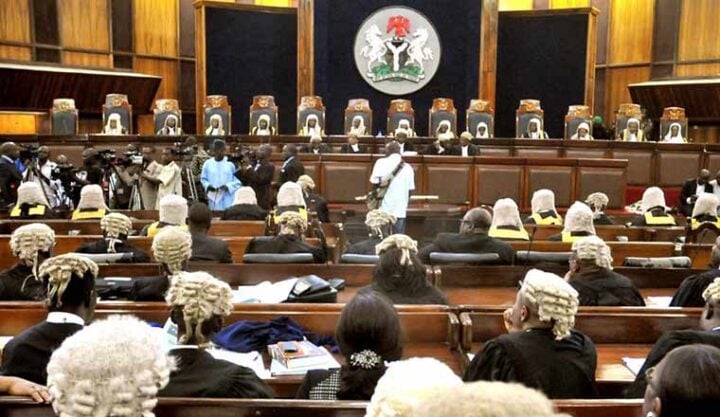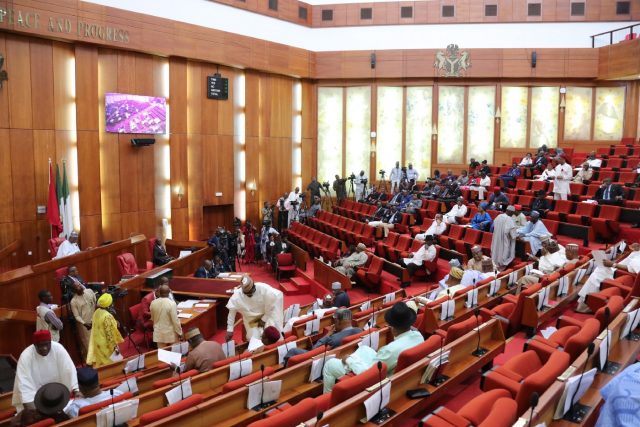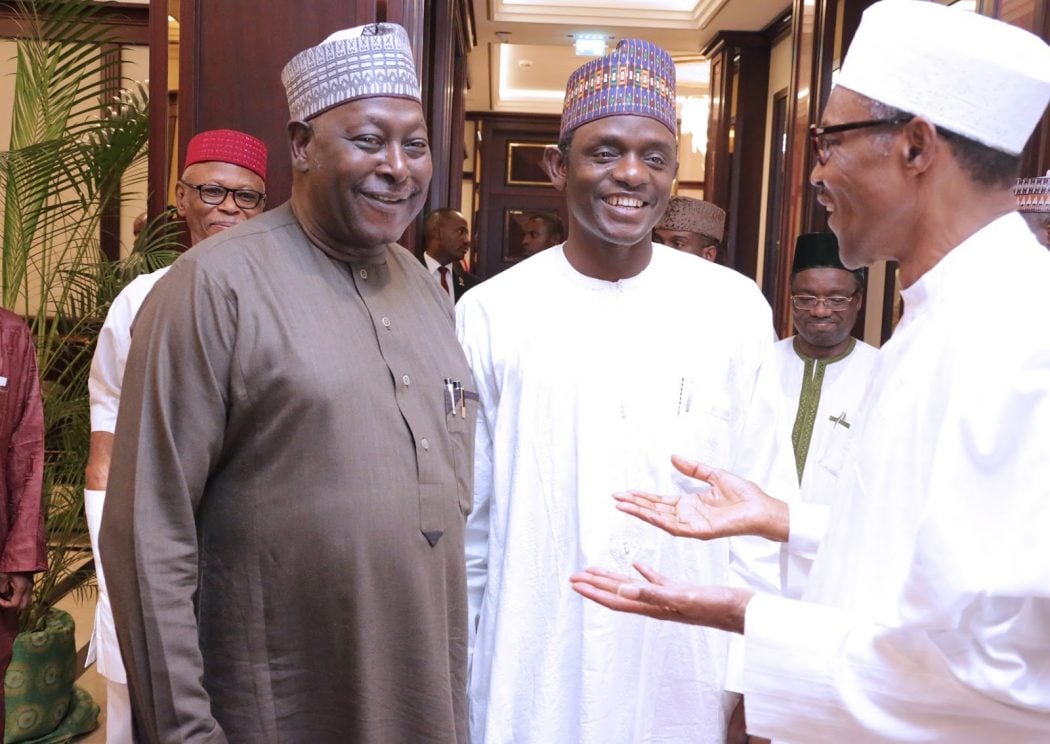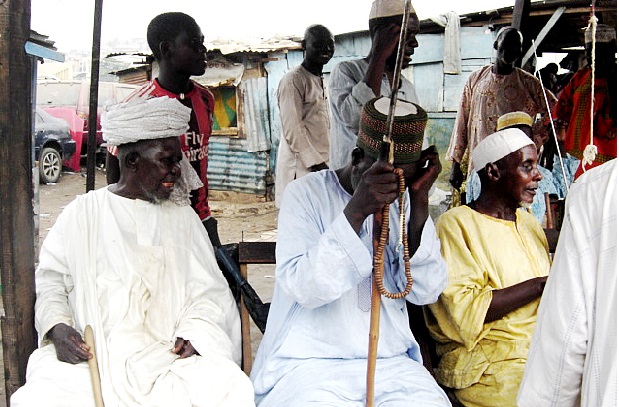In a unanimous judgment delivered on February 14, 2020, the Supreme Court of Nigeria sacked the Bayelsa State Governor-elect, David Lyon and his Deputy, Biobarakuma Degi-Eremieoyo who had run on the platform of the All Progressive Congress (APC). The judgment was nullified on the grounds that Degi-Eremieoyo presented false information to the Independent National Electoral commission (INEC) in his nomination form for the governorship election held on November 16, 2019. Consequently, the Court directed INEC to declare the results of the election following the cancellation of the votes scored by the APC in the election. Barely 24 hours later, INEC declared the candidate of the People’s Democratic Party, Senator Duoye Diri as the new Governor-Elect.
No doubt, the pre-election matter filed by the PDP against the APC and its governorship candidates in the Bayelsa Stare has been rested by the judgment
it has since continued to generate reactions from a cross section of the society. With respect, majority of people who have reviewed the judgment have not paid attention to the line of dichotomy which has been drawn between pre-election and election petitions by section 285 of the Constitution as amended by Alteration Act No 8 of 2017. Contrary to the belief of some lawyers the said amendment has altered the electoral jurisprudence of the country. This review is essentially anchored on the implications of the effect of the amendment on pre-election matters.
PENALTY FOR FIELDING UNQUALIFIED CANDIDATES BY POLITICAL PARTIES
By virtue of section 31 of the Electoral Act, disputes arising from the information contained in the nomination form of a candidate contesting any election shall be resolved before the election is conducted by the Independent National Electoral Commission. In other words, it is a pre-election matter which cannot continue to be heard once the the election has been held. Indeed, the penalty for fielding unqualified candidates by political parties has to be meted out to those who are found to have violated the provisions of the Electoral Act before the election. I am referring to Section 31(5-8) thereof which states:
Advertisement
“5. Any person who has reasonable grounds to believe that any information given by a candidate in the affidavit or any document submitted by that candidate is false may file a suit at the Federal High Court; High Court of a State or FCT against such persons seeking a declaration that the information contained in the affidavit is false
6. If the Court determines that any of the information contained in the affidavit or any document submitted by that candidate is false, the Court shall issue an order disqualifying the candidate from contesting the elections.
7. A candidate for an election shall, at the time of submitting the prescribed form, furnish the Commission with an identifiable address in the State where the intends to contest the election at which address all documents and court processes from either the Commission or any other person shall be served on him.
Advertisement
8. A political party which present to the Commission the name of a candidate who does not meet the qualifications stipulated in this section, commits an offence and is liable on conviction to a maximum fine of N500,000.00”
Since an unqualified candidate is expected to be disqualified from contesting the election the pre-election matter praying for his or her disqualification has to be decided before the election. A candidate cannot be disqualified from participating in an election that has been held and concluded. Having regards to the fact that the nomination of governorship candidate and deputy governorship candidate is a joint ticket section 182 (1) of the Constitution provides that no person shall be qualified for election to the office of Governor of a State if he or she fails to meet the conditions stiputed in the section including the presentation of a forged certificate to the INEC. The same prerequisites are applicable to a deputy governorship candidate pursuant to section 187 (2) of the Constitution.
As far as section 285 of the Constitution is concerned a pre-election matter can no longer be turned into a post election matter and determined after the election. Ex abudanti cautela, section 285 (14) of the Constitution as amended in 2017 defines a pre-election matter as a suit filed by an aggrieved aspirant or political party “….in respect of the selection or nomination of candidates for an election” or “……in respect of preparation for an election.” It is crystal clear from the novel provision of the Constitution that a pre-election case filed “in respect of preparations for an election” cannot metamorphose into a post election case.
RIGHT OF APPEAL BY PARTIES IN PRE-ELECTION MATTERS
Advertisement
It was generally believed in legal circles that a pre-election could be continued after an election being challenged has been held. The practice was questioned by the Supreme Court in the case of Toyin Obayemi v People’s Democratic Party (unreported Suit No SC. 308/2018) wherein the appellant had filed a pre-election case at the Federal High Court on 10th April 2015 to challenge the nomination of the 3rd Respondent on grounds that he forged the waec certificate submitted to INEC. Before the determination of the case the respondent won the election to the Ekiti State House of Assembly. Thereafter, the learned trial judge granted the relief sought by the appellant and ordered the appellant’s removal from the assembly. The appeal filed at the Court of Appeal by the Respondent was allowed. Dissatisfied with the decision the appellant filed an appeal at the Supreme Court on March 13, 2018.
In a judgment delivered on 18th January 2019 the Supreme Court dismissed the appeal on the ground that it was filed after the 60 days stipulated by section 285 of the Constitution notwithstanding that the said amendment which limits the time for pre-election matters came into force on June 18, 2018 i.e. during the pendency of the appeal. In fact, the amendment took effect three months after the filing of the appeal. In justifying the position of the Court, Tanko Muhammad JSC as he then was held that “Thus, once an appeal comes outside the time set out for its determination, the court has no jurisdiction to entertain it. See Chigbu v. Tonimas (Nig.) Ltd. (2006) 31 WRN 179; (2006) 9 NWLR (Pt. 84) 189, Ogun State Govt. v. Dalami (Nig.) Ltd. (2017) 9 NWLR (Pt. 1035) 66. It is clear that this appeal has been caught up by the limitation of time in section 2 (13)) of the Constitution afore stated. That section renders the appeal a nullity. By this reason alone, the appeal is rendered incompetent and it is hereby struck out.”
In applying the law with retrospective effect to the pending appeal the Supreme Court was desirous to put an end to the pre-election matter pursued after elections. It is on record that the definitive pronouncement of the Supreme Court in the appeal ended all pre-election matters pending in the various high courts and appeallate courts at the material time. Even though the law did not extinguish the right of aggrieved persons to exercise their right of appeal to finality the Supreme Court did so in order to discourage them from turning such matters into post election cases.
However, since section 285 (6) & (7) of the Constitution provides that a court in a pre-election matter shall deliver its judgment within 180 days and an appeal arising therefrom shall be determined within 60 days from the date of filing the appeal it is submitted that any of the parties involved in the Bayelsa state pre-election case could have filed an application for interlocutory injunction restraining INEC from conducting the Bayelsa state governorship election pending the determination of the pending appeal in the matter. More so, that the Court of Appeal had granted a stay of the execution of the order of the Federal High Court which had disqualified the APC governorship and deputy governorship candidates pending the determination of the appeal. I am of the strong view that the application to postpone the election would have been granted in view of the position of the Supreme Court in the case of Obi v INEC (2007) 45 WRN 1.
Advertisement
But once an election has been conducted and concluded the results cannot be challenged in a trial court or appellate court via a pre-election matter. At that stage the challenge of the election could only be questioned at an election petition tribunal. No doubt, the appellate courts are empowered to exercise jurisdiction in respect of appeals arising from the decisions of the election petition tribunals. Hence, section 133 of the Electoral Act provides that “No election or return under this Act shall be questioned or in any manner other than by election petition complaining of an undue election or undue return (in this Act referred to as an “election petition”) presented to the competent tribunal or court in accordance with the provisions of the Constitution or of the Act , and in which the person elected or returned is joined as a party.”
Indeed, the jurisdiction of any court to hear a pre-election matter has been completely ousted by section 285 (2) of the Constitution which provides that the governorship election petition tribunal shall, “to the exclusion of any court or tribunal have jurisdiction to hear and determine petitions as to whether any person has been validly elected to the office of Governor or Deputy Governor of a State.” Therefore, the election petition tribunal is the only juridicial organ which has the competence to annul an election based on disqualification of an elected Governor or Deputy Governor. If the election petition tribunal annuls an election on grounds of disqualification it shall order a fresh election so that the electorate can elect another candidate of their choice.
Advertisement
In Bayo v. Njiddah (2004) 8 NWLR (PT 876) 544 at 636-637 it was held by Ogbuagu JCA (as he then was) that: “Having nullified the election, it is now settled, that where the winner is disqualified because of the failure to fulfill any of the statutory requirements including the Constitution as in the instant case leading to three(3) appeals, the candidate who scored the next in majority votes cannot be declared as the winner. See UNCP & 2 Ors. v. DPN & Ors. (1998) 8 NWLR (PT 560) 90 at 95 CA. Secondly, although where a disqualified person is elected (not as in the instant case,) the votes cast for him, are thrown away, and his opponent, is deemed to be elected, but this can only be so, if the facts giving rise to the disqualification, were so notorious as not to require proof and such facts were within the knowledge of the electorate.
In other words, where the disqualification is not notorious and depends on either legal argument or complicated facts, votes given for a candidate (even thought he might be unseated by reason of his disqualification), would not be thrown away, so as to give the seat to the candidate with the next highest number of votes. But instead there must be a fresh election. Put in another way, for the votes given for a candidate to be thrown away, the voters must before voting, either have had or be deemed to have had notice of the fact creating the candidate’s disqualification. See the case of Re: Bristol South East Parliamentary Election (1961) 3 All E.R 354 at 379 DC (1964) 2 Q.B. 257.”
Advertisement
In the same vein, in Mele v Mohammed (1999) 3 NWLR (Pt 595) 425 it was held that where a person is disqualified after being elected naturally the votes cast for him at the election would not count for any purpose whatsoever. However, the other candidate who opposed him at the election cannot be declared automatically without more and this is notwithstanding that he secured the next highest number of votes. He is required to further show that the electors were aware of the factors that gave rise to the disqualification.”
From the foregoing, it is indubitably clear that the decision of the Supreme Court in respect of Bayelsa state governorship election was anchored on the assumption that a pre-election could be heard and determined after the conclusion of an election. Although I fully agree with those who have argued that the Supreme Court is determined to halt the impunity of god fathers who impose candidates on political parties, the rights of voters which might have accrued ought to be considered.
In other words, in sanctioning political parties that breach the provisions of the Electoral Act or the Constitution the verdict of the courts must not be substituted for the franchise of the electorate.
Advertisement
POWER OF SUPREME COURT TO REVIEW ITS JUDGMENT
It is trite law that the Supreme Court has inherent powers to set aside its own judgment obtained on fraud or if it was reached per incuriam. In Johnson v Lawanson (1971) 7 NSCC 82 the overruled itself. In the leading judgment of the Court, Coker J.S.C. said held that “when the court is faced with the alternative of perpetuating what it is satisfied is an erroneous decision which was reached per incuriam and will, if followed, inflict hardship and injustice upon the generations in the future or of causing temporary disturbances of rights acquired under such a decision, I do not think we shall hesitate to declare the law as we find it.”
However, it is pertinent to point out that the case of Johnson v Lawanson (supra) and similar cases are inapplicable where the jurisdiction of the Supreme Court is ousted by any statute of limitation. Therefore, it is legally impossible for the Court to review its judgment in the Bayelsa State governorship pre-election case after the expiration of the 60 days prescribed by section 285 (7) of the Constitution as amended. Politicians who planning to file all manners of applications for the review of the previous judgments of the apex court are advised to pay attention to the case of Professor Ugba v Suswam (2014) 14 NWLR (Pt 1427) 264.
In declining to review its previous judgment in that case the Court held that its jurisdiction had been ousted by section 285 of the Constitution. According to Mary Peter-Odili JSC: “For emphasis, when the Constitution by the provisions of Section 285(6) and (7) imposed on this court and parties, the period within which whatever needs be done must be done and not outside that time frame, there is helplessness in those ouster clauses and nothing can be done about it. The implication is that the matter has died and is buried and attempting to go round that constitutional mortal blow is an act of desperation which only lead to embarking on an academic journey best left for the Ivory tower of knowledge which our Universities are intended for and the court is not the right forum.”
CONCLUSION
A leading member of the APC and the Minister of State in the Labour Ministry, Mr. Festus Keyamo SAN has rightly said that the ruling party has itself to blame for its electoral misfortune in Bayelsa State. More importantly, the APC deserves condemnation for its opportunism which has frustrated genuine electoral reforms. It is common knowledge that one of the principal recommendations of the Uwais Electoral Reform Panel is that all pre-election cases and election petitions be concluded before the inauguration of winners of elections. Before 2015, the apc was in the forefront of the campaign for the implementation of such electoral reforms. But upon assumption of power the apc has frustrated all efforts to reform the electoral process. By manipulating enormous powers of the State to win dubious elections the apc has continued to behave like the pdp which once believed, that it would rule the country for 60 years
Views expressed by contributors are strictly personal and not of TheCable.
Add a comment







